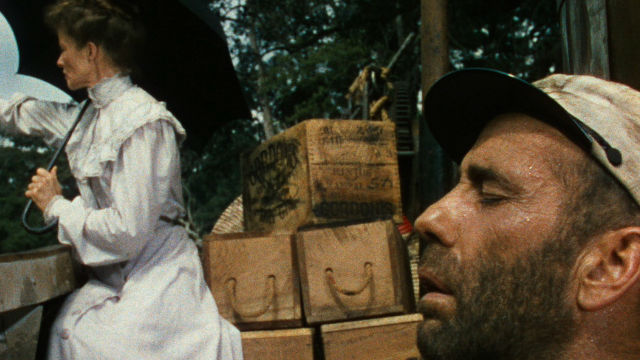The African Queen (1951) 
“Bogart the King is back with the ‘Queen!'”

The African Queen (1951)
Director: John Huston
Cast: Humphrey Bogart, Katharine Hepburn, Robert Morley
Synopsis: In Africa during WWI, a gin-swilling riverboat captain is persuaded by a strait-laced missionary to use his boat to attack an enemy warship.
It’s difficult not to dwell on what the future holds for the prim Rose Sayer (Katharine Hepburn – Bringing Up Baby, The Philadelphia Story) and plebeian Charlie Allnut (Humphrey Bogart – Casablanca, The Big Sleep) after The African Queen fades to black. Sayer’s world of bible classes and afternoon teas is diametrically opposed to that of the gin-guzzling Allnut, and it’s unlikely that either of them would find it easy to make concessions towards the other’s lifestyle. But then, that’s not really our concern, and we can at least draw pleasure from the way in which the misfortunes of war throw together these two unlikely bedfellows.
Allnut pilots a rusting steamboat along the Ulanga River in a German colony in Africa in 1914. He delivers post to the portly Christian missionary Reverend Sayer (Robert Morley – The Alphabet Murders, When Eight Bells Toll) and his spinster sister, Rose, and endures uncomfortable afternoon tea with the couple with whom he appears to have nothing in common. When German troops burn down the mission after war is declared, Sayer succumbs to a delirium which ultimately claims his life, leaving Rose alone and unprotected. Fortunately for her, Allnut returns to the mission and together they embark on a voyage, not only of escape, but of sabotage, as they endeavour to sink a strategically positioned German ship using a couple of home-made torpedoes.
Bogart rarely seemed comfortable in comedy roles, but his tough-guy screen persona was so seamlessly incorporated into the part of the hard-drinking but essentially decent Charlie Allnut, that the part could have been specifically written for him. Allnut was transformed from a British Cockney into a Canadian for the movie in order to accommodate Bogie’s accent, although Allnut’s working class origins are still evident in his mostly deferential attitude towards Sayer. Nevertheless, this change of nationality and social position not only alters the dynamics of his relationship to Rose Sayer, but also softens the intended impact of the increasingly close bond that develops between them. If its collision of ostensibly incompatible worlds isn’t quite the volatile concoction one might have hoped for as a result, the absence is compensated for by the endearing innocence of this odd couple’s unorthodox courtship, and the growing respect they share for one another.
Paradoxically, given that the film is chiefly remembered for the relationship between its two main characters, the main source of conflict is found in the African jungle and in the waters of the Ruiki River, which justifies Huston’s decision to film on location under horrendous conditions which saw most of the cast and crew succumb to sickness (only Bogart and Huston escaped the indignities of dysentry, thanks to their prodigious intake of alcohol). No other movie came close to capturing its stars in states of authentic physical discomfort, or the sticky, torrid closeness of a tropical climate in the way that The African Queen did.
(Reviewed 27th December 2015)
httpv://www.youtube.com/watch?v=88jytHOsDos

